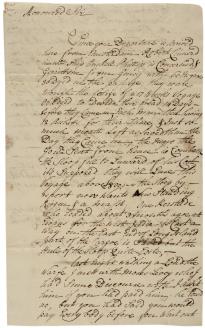The death of enslaved Africans on a voyage, 1725
A Spotlight on a Primary Source by Stephen Bayard
 Slavery in English America underwent profound changes during the first two centuries of settlement. During the early seventeenth century, some Black laborers were enslaved; others, however, were treated like White indentured servants and were freed after a term of service.
Slavery in English America underwent profound changes during the first two centuries of settlement. During the early seventeenth century, some Black laborers were enslaved; others, however, were treated like White indentured servants and were freed after a term of service.
As early as the late 1630s, however, English colonists began to make a sharper distinction between the status of White and Black laborers, and merchants began importing enslaved Africans to the thirteen North American colonies. The passage in the holds of ships was a horrific experience, and many did not survive.
This matter-of-fact letter written in 1725 by Stephen Bayard in New York to Robert Livingston (1654–1728), a wealthy and influential landowner and trader from Albany, New York, reports that “30 [negroes] dyed in the passage” on a seventeen-week voyage to New York due to a shortage of food.
A full transcript is available.
Excerpt
Since your Departure is arrived here from Amsterdam Robert Linnerd in Wch ship Onckell Phillip is Concerned, & Gerrittsen from Gersey with 60 negroes 30 dyed in the passage, they ware trough the fatige of a 17 weeks Voyage obliged to Divide their bread 14 Days – before they came in; Each man then having 12 Bisketts for their share & Just so much meath Left as Served them the Day they Came in –;
